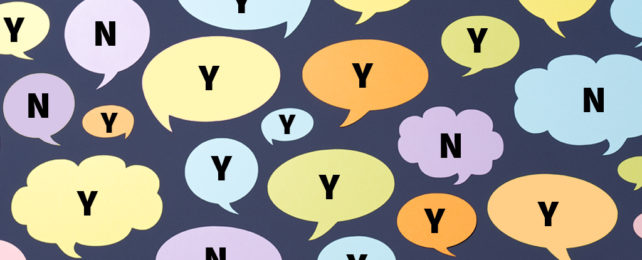Although we're more connected than ever, hatred and bigotry towards social groups seen as 'Other' remain rife in our world.
To maintain a positive self-image, individuals may claim false positive beliefs toward such people. But new research reveals that patterns in their language can betray this dishonesty.
"People lie for a reason, especially when the truth is a problem or when they want to maintain a reputation of being prosocial," University of Oregon communications researcher David Markowitz writes in his paper.
In a large online experiment, Markowitz asked 1,169 volunteers to rank from 0 to 100 how 'evolved' they thought eight different social groupings are.
These groups were Arabs, Muslims, immigrants, Americans, Democrats, Republicans, African-Americans, and Asians. The survey primed responses by mentioning from the outset that people can vary in how 'human-like' they seem.
Participants then wrote about their thoughts, feelings, and opinions of the groups they'd ranked as the most or least evolved (or random groups if there were ties) for five minutes, but half the participants were asked to lie about their opinions, while the other half were asked to be honest.
A text analysis program, Linguistic Inquiry and Word Count, could distinguish between honest and dishonest answers based on the types of words used.
"…[L]anguage actually matters here and reveals psychological aspects of communicators who hold a different internal belief than their outward portrayal," he says.
Analyzing the results, Markowitz found those who lied gave themselves away by using fewer self-references and more negative emotions than those who were honest. The volunteers who dehumanized the group they wrote about also used more negative emotions.
"The internal belief that a group is less than human, but the outward portrayal of group support communicated for impression management purposes – was associated with a different rate of negative emotion terms than honest dehumanization," Markowitz explains.
It seems that liars misestimate the amount of supporting language they require to come across as truthful. This miscalculation has been previously noted in many other situations too.
"For example, an analysis of psychologist Diederik Stapel's scientific fraud observed he overused scientific terms in fraudulent first-authored papers compared to genuine first-authored papers," Markowitz writes.
"Fake 911 calls could not approximate the same level of fear, anxiety, or distress as genuine calls during an emergency event. This collective evidence suggests genre-specific details are often incorrectly approximated in false speech compared to truthful speech."
This effect was even more pronounced when the volunteers were lying about the groups they viewed as most highly evolved.
They used the most negative language out of all the experimental categories. Markowitz suspects their overestimation was exacerbated here because these participants felt the most discomfort about lying when it was about a group of people they respected and likely associated themselves with.
More research is required to test the study's limitations and ensure this method is reliable, but Markowitz believes understanding these processes better may help us mitigate hateful and deceptive rhetoric, which causes psychological and social harm to minority groups.
"We can do a pretty good job of revealing (internal beliefs) in language, and this is one of the first studies of its kind to suggest specific word patterns reveal these psychological processes," Markowitz concludes.
This research was published in the Journal of Language and Social Psychology.
